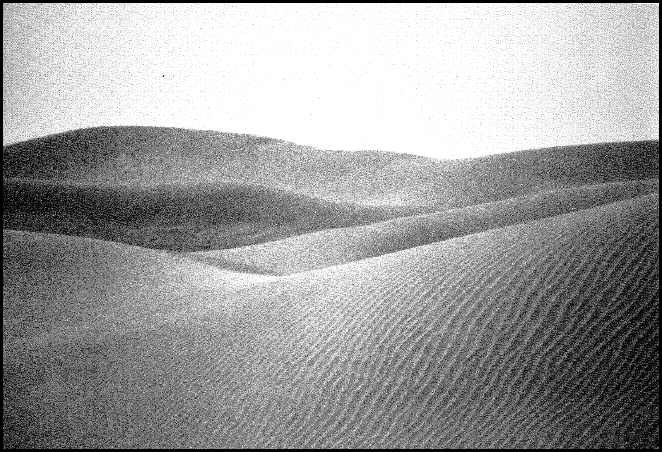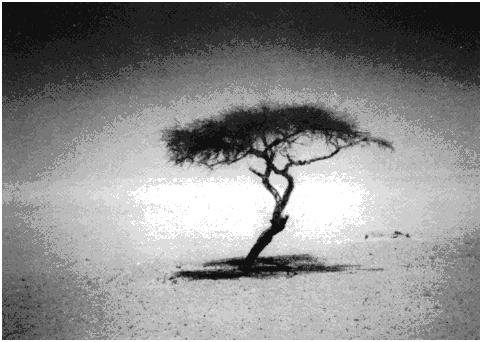
Hyenas and
Wriggle-Worms
L. M. NesbittIn 1926, L. M. Nesbitt and two companions made a journey, by donkey and foot, across the Danakils, lying between the Abyssinian Plateau and the old Italian Colony of Eretrea on the Red Sea Coast.
The editor at Penguin who published Nesbitt's saga called it "an outstanding feat, a pioneering journey, through an unknown land."
Nesbitt received the "much-coveted Murchison Grant" for his feat.

The market-day was to be our last at Erifible, for we proposed to leave early on the morrow. That night the hyenas were more numerous than ever, as they gathered to fall on the refuse that had been left in the market-place.The disgusting beasts kept running round our camp as though they were on patrol duty, and their lugubrious laughter sounded through the great amphitheatre, and echoed in the ravines to the west. Other yells sounded from afar, and the near and distant sounds of this ghouls'-mirth, added to the sight of the shadowy forms, which passed trotting and trotting round our camp, caused a feeling of uneasiness in one's mind.
For the low nature of that vermin is most hateful, and here particularly, seeing them flitting in the uncertain light of a weak moon, they seemed strangely horrid and loathsome. Our camels and mules were tethered very close together, and under our observation, for hyenas will spring at the haunches of living animals, and tear off pieces of their flesh.
We managed to sleep fairly well, notwithstanding the restlessness of our animals. The poor beasts were scared by the vermin, which laughed and yelled, and circled incessantly about the camp, often coming quite close to them.
We left at an early hour in the morning, retracing our steps under the acacias and euphorbias. We came to the Ija, but did not halt there, and on coming near to the village of Gabaro we left the track by which we had climbed into the mountains, and turned to the north-east.
Presently we halted amongst some trees in what seemed a fair place, but when I had settled myself under one of the trees I found that I was becoming covered with ticks. Myriads of them were crawling on my breeches, and some had already penetrated my clothing and reached my skin.
I jumped up, and tried to free myself from these pests, but I was obliged to change my clothing before I could get rid of them. Pastori and Rosina were in the same plight. Afterwards we chose another tree, under which no cattle appeared to have rested, for it is the cattle which drop these ticks on the ground.
As we wore boots we were free at least from wriggle-worms, whereas our men, who went barefoot or in sandals, suffered much from these parasites. They burrow deep under the skin and must be extracted with a knife-point. It is sometimes an exceedingly painful operation, yet it was as common with our men as cutting the nails was with us.
The mules were walking hives of horse-flies. If a man passed his hand under a mule's belly, the noise made by the disturbed horse-flies was like that of a myriad of swarming bees. This used to make my blood boil, yet I could not free the unfortunate mules of their torment.
All the flies within a wide compass would congregate upon them, and one of their number, the weakest mule of them all, was more tortured than any, as he would do nothing to drive the insects away. He would neither flick them with his tail, nor swing his head round at them. He had no strength to spare for such exertions.
At the first stop, red in the face with rage, I, with the help of some of the men, would kill and kill horse-flies in a hopeless attempt to give some relief to our poor mules. Hardly a single fly settled on the camels. I tried rubbing kerosene on the parts where the mules were most subject to their attack, but it had no effect. I smeared the animals with mud, which caked hard, but even that failed.
For the flies left the mules and settled on the camels until the mud had crumbled and dropped off the former, when they returned to their favourites in greater numbers than ever. I passed bundles of lighted straw under their bellies, and knowing what I was trying to do, the mules stood still and docile. But although I singed the wings of a few hundred flies, it was of little consequence, for the vast bulk of them crawled and flew on the animals' heads, or retired for a brief spell to the nearest camel.
It was impossible for our mules to put on flesh, or even keep in good condition while they were victimized by these parasites. Their blood was sucked from them day and night. In the lowlands, I had nearly freed the poor beasts from flies, as the insects can scarcely live in desert country. But as soon as we came on the Plateau they were covered with them again.
We had agreed to continue our journey in the afternoon, but we were prevented by heavy rain. A fierce wind had begun to blow, and it was only with great difficulty and after we had become wet through that we succeeded in pitching our tent. There we spent the night.
On the morrow we resumed our journey and descended amongst rocks until we came to a dry torrent called Ereidera. It contained some very good water-holes, and after having passed to the opposite side, we camped on its bank. On the way we had encountered some ariels, but they had not come within rifle range. We shot some guinea-fowl.
Again heavy weather forced us to remain where we were for the night and, in order to make some use of our enforced leisure, I called Abulker, the one-eyed servant who had made such a remarkable recovery from his sickness in the Awash valley, and with his assistance proceed to kill the worms which had embedded themselves in the inside of our mules' lower lips.
I had noticed that when they took a mouthful of grass, even though it was free from thorns, they twisted their lips as though they had been stung. They ate very little, and the act of mastication seemed painful to them. The cause of all this was the worms which had penetrated into their lips.
I now ordered one of the men to bring some lighted brands from the camp fire, and made a second fire for our surgery. Makonnen held and stroked the mules to keep them quiet, though as soon as they realized that they were to have medical treatment the animals stood quiet, with a knowing air, one ear moving round to catch our remarks.
Albulker, since his recovery at Unte, had taken a delight in acting doctor or veterinary surgeon to all, and he was jealous of anybody else being employed in such work. He now produced some-curved flat irons about the size of the palm of one's hand, which are used to cauterize festering wounds. These we heated in the fire till they were red hot. We then turned the underlip of the mule inside out and, with the red-hot iron, burnt the flesh and the worms inside it. The mules seemed to enjoy the treatment.
We also burnt bundles of straw under their bellies, and this too they positively luxuriated in, for it burnt or drove away the torturing flies and soothed the irritated skin. Before seeing this I would never have believed that a mule would stay quiet with a burning faggot under him. With the same hot irons we cauterized the wounds on the backs of two camels, which could not carry loads by reason of them.

--- From Desert and Forest:
The Exploration of Abyssinian Danaskil
L. M. Nesbitt
©1934 Penguin Books